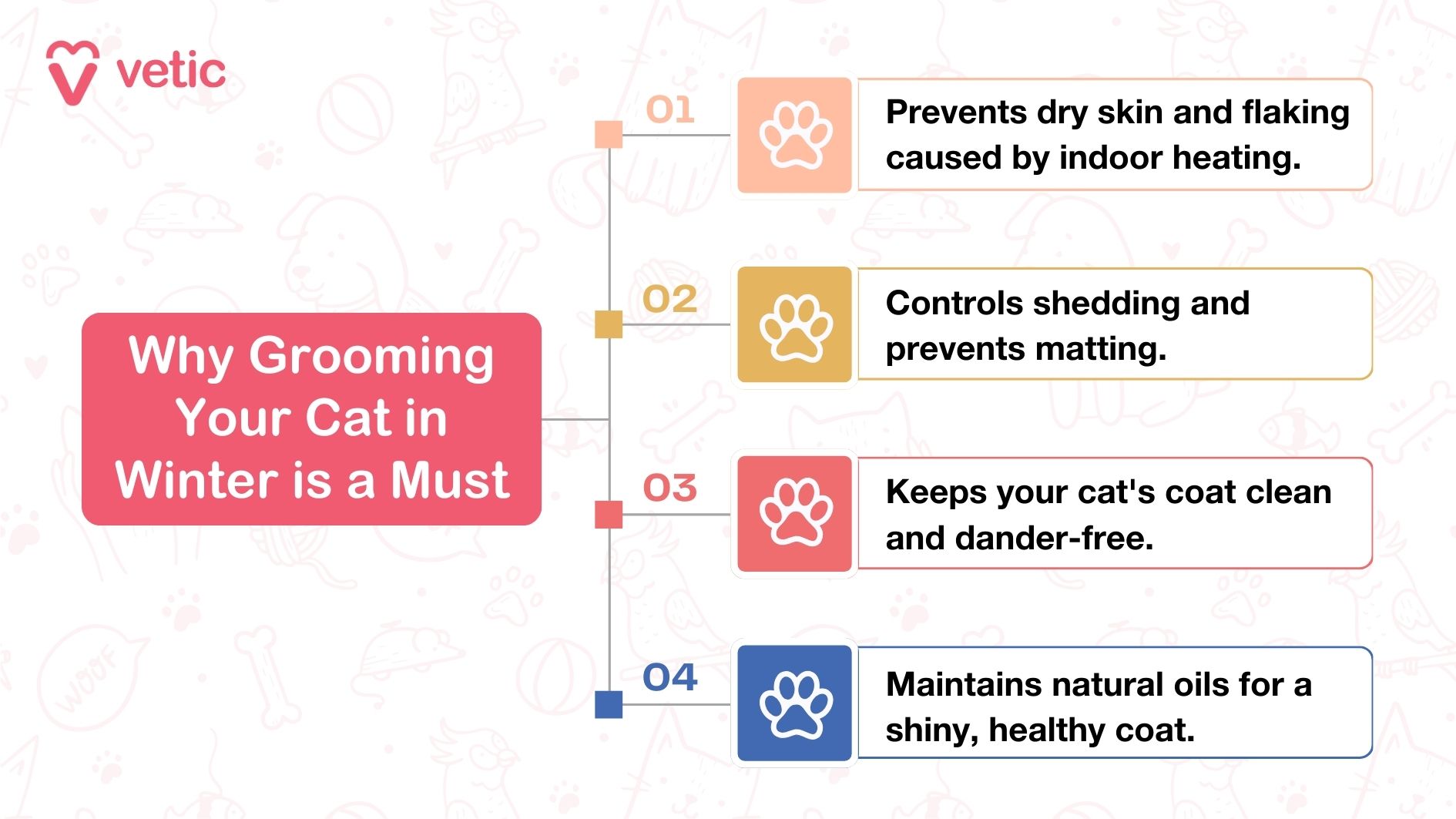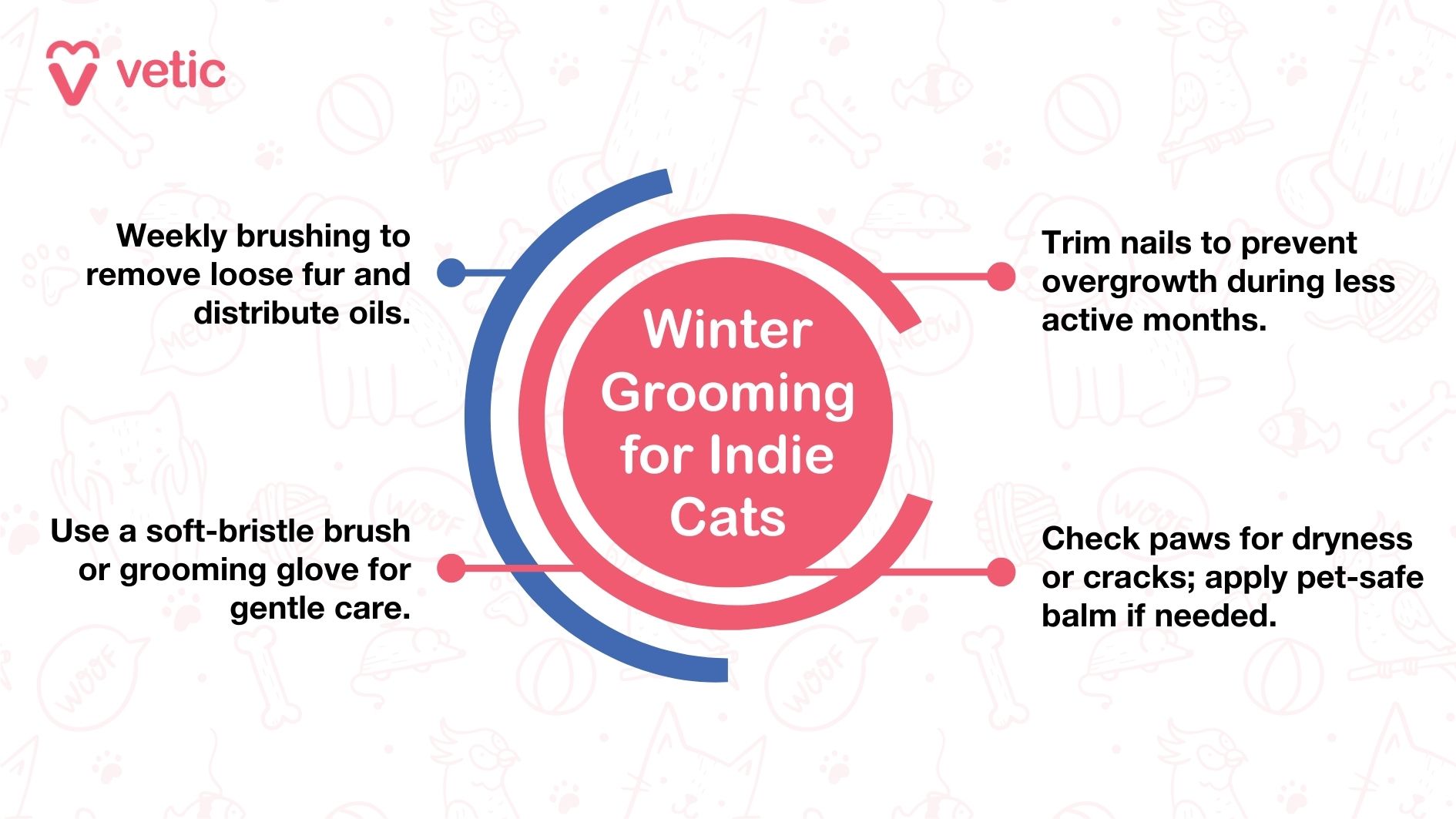Winter can be harsh on your cat’s skin and coat, making grooming an essential part of their seasonal care. As the temperatures drop, indoor heating and dry air can lead to flaky skin and dull fur. Winter grooming for cats not only helps maintain their natural skin oils but also prevents matting, especially in long-haired breeds. By adapting grooming practices to suit the winter season, you can ensure your feline stays cozy and comfortable.
Why is Winter Grooming for Cats Essential?

Cats are naturally equipped to manage their grooming needs, but winter presents unique challenges. Here’s why extra attention is necessary:
- Dry Skin: Winter air can strip moisture from your cat’s skin, leading to itching and irritation.
- Shedding Control: While cats shed less in winter, loose fur can still accumulate and cause matting.
- Hygiene Issues: Cats tend to sleep more during colder months, making regular grooming necessary to keep their coats clean and free from dander.
Cat Grooming Tips for Winter:
- Brush your cat’s fur at least twice a week.
- Use a humidifier to counteract dry indoor air.
- Monitor your cat’s skin for signs of flaking or redness.
Grooming Needs of Indie Cats vs. Long-Haired Breeds

Grooming for Indie Cats and Short-Haired Cats
Indie cats, known for their short, low-maintenance coats, are generally easier to groom. However, even these hardy cats benefit from winter grooming:
- Coat Maintenance: Indie cats need weekly brushing to remove loose fur and distribute natural oils.
- Skin Care: Short coats make them more prone to dry skin in winter, so consider using a grooming glove for a gentle massage.
- Nail Trimming: As activity levels drop in winter, their claws may need trimming to prevent overgrowth.
Quick Grooming Tips for Indie Cats:
- Use a soft-bristle brush for regular grooming.
- Check paws for dryness or cracking.
- Keep grooming sessions short and rewarding.
Long-Haired Breeds: Himalayan, Siamese, and Persian Cats
Long-haired cats have luxurious coats that require more intensive grooming, particularly in winter. Neglect can lead to matting, which is uncomfortable and unhealthy for your cat.
- Brushing: Long-haired breeds like Persians and Himalayans need daily brushing to prevent tangles and mats.
- Bathing: Monthly baths with a cat-specific shampoo help remove dirt and excess oils.
- Coat Trimming: Professional grooming may be necessary to keep their fur manageable.
- Ears and Eyes: Breeds like Siamese often have sensitive eyes that need regular cleaning to avoid discharge buildup.
Quick Grooming Tips for Long-Haired Cats:
- Use a wide-toothed comb followed by a slicker brush for thorough grooming.
- Check for hidden mats in areas like armpits and behind the ears.
- Use a damp cloth to clean around their eyes gently.
Nail and Paw Care in Winter
Winter conditions can be tough on your cat’s paws, especially if they venture outdoors. Snow, ice, and salt can irritate their delicate pads.
- Nail Trimming: Trim nails every 2-3 weeks to prevent them from snagging on carpets or furniture.
- Paw Care: Check for cracks or dryness and apply a pet-safe balm if needed.
- Post-Outdoor Cleaning: Wipe paws with a damp cloth to remove salt and debris.
Quick Tips for Cat Nail and Paw Care:
- Invest in a pair of cat-specific nail clippers.
- Make paw checks a part of your grooming routine.
- Keep your cat’s nails dull with a scratching post.
Maintaining Cat Skin and Coat Health in Winter
Your cat’s coat acts as a natural insulator, but winter air can impact its health.
- Dietary Support: Ensure your cat’s diet includes Omega-3 and Omega-6 fatty acids for skin and coat health.
- Hydration: Encourage water intake by providing fresh water in multiple locations.
- Grooming Frequency: Increase brushing sessions to stimulate natural oil production and reduce shedding.
Quick Winter Grooming Tips for Cat Skin and Coat Care:
- Use a grooming spray to combat dryness.
- Offer wet food alongside kibble to boost hydration.
- Avoid over-bathing as it can strip natural oils.
Does Winter Grooming for Cats Need to Be Professionally Done Always?
While professional grooming can be beneficial, it’s not always necessary. Many winter grooming needs for cats can be handled effectively at home, especially if your cat is comfortable with the process.
- Benefits of Professional Grooming for Cats:
- Ideal for long-haired breeds prone to matting.
- Helps with tasks like coat trimming and deep cleaning.
- Groomers can spot hidden skin issues or infections.
- Grooming at Home:
- Suitable for short-haired and Indie cats.
- Regular brushing, nail trimming, and paw care can be done with basic tools.
- Build trust by keeping sessions calm and rewarding.
Tips for At-Home Cat Grooming:
- Use high-quality grooming tools like combs and nail clippers.
- Take breaks if your cat shows signs of stress.
- Seek advice from a vet or groomer if unsure about certain tasks.
Special Considerations for Senior Cats
Senior cats may have additional winter grooming needs due to reduced mobility or health issues.
- Joint-Friendly Grooming: Use soft brushes and avoid pulling on their fur.
- Help with Self-Grooming: Assist them in reaching areas they can’t groom, like their lower back.
- Check for Health Issues: Look for signs of arthritis or other conditions that may require veterinary attention.
Quick Winter Grooming Tips for Senior Cats:
- Create a warm, quiet grooming space.
- Be patient and gentle during grooming sessions.
- Schedule regular veterinary check-ups.
Conclusion
Each cat has unique grooming needs, especially during the winter months. While Indie cats may need minimal upkeep, long-haired breeds require daily attention to prevent matting and maintain a healthy coat.
If your cat struggles with social or separation anxiety, grooming them at home can be a comforting alternative. Always observe your cat’s behavior and consult a veterinarian if you notice any issues with their skin or coat. With the right care, your feline friend will thrive all winter long.

